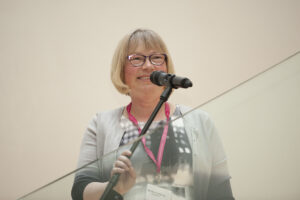In this very special 60th anniversary year for the Romantic Novelists’ Association it’s inspiring to look back at the history of the organisation and the extraordinary women who have made it the force it is today.
The origins of the RNA date back to January 1960 when author Vivian Stuart took the initiative to create an organisation dedicated to promoting and celebrating excellence in romantic fiction. Vivian was a redoubtable woman who had served in the Army in Burma during the Second World War, studied law, medicine and chemistry, married four times, had five children, travelled widely and was an extraordinarily prolific and successful author. She was the driving force that the organisation needed to get off the ground, and with the support of other famous novelists of the time including Denise Robins, Barbara Cartland and Netta Muskett they certainly made an impact.
Denise Robins, who became the first President of the RNA, was known for her exceptional glamour as well as for telling a cracking good story. She was a consummate networker whose connections in the publishing industry and the wider world were of huge benefit to the fledgling organisation. As for Dame Barbara Cartland, she understood the value of branding long before it became a buzzword!
In order to achieve the aims of the organisation and promote and celebrate excellence in romantic fiction, these authors aimed to attract more respect to the genre. It’s interesting to see this theme recurring throughout the history of the RNA and indeed the history of romantic fiction. Romance, so frequently seen as a genre written for and by women, has experienced the twin criticisms of gender and literary snobbery. True fans of the genre, as well as the authors, know however that romantic fiction does not need literary approval. Those who denigrate it are missing the point and missing out. The strength of the genre and of the organisation lies in the loyalty of its aficionados.
Over the following decades new authors have taken the organisation forward, mirroring the society in which we live and its interests and preoccupations in the same way that these are reflected in the love stories of each different age. Lucilla Andrews was one of the RNA’s authors whose fiction mirrored her life experience, featuring as it did heroines who might be a single parent and breadwinner, as she had been herself. Rosamunde Pilcher wrote about family dynamics, about love and loss and hope. But whilst there have been outstandingly successful author members throughout the RNA’s 60 years, it is the strength of the whole membership together that forges an organisation.
In the nineteen seventies the RNA began to build on one of its greatest strengths; the ethos of members helping and supporting other authors at all stages of their career. From the start, the RNA had set out to foster new authors in the genre through its New Writers Scheme, where established writers mentor aspiring novelists through a critique programme. The conference, introduced in the 1990s, also allows members and industry professionals to meet and discuss the latest publishing trends and career opportunities. Another important development, now one of the greatest strengths of the RNA, is the system of local chapters, which provide additional opportunities for networking. The sixty-year history of the RNA demonstrates its strength through the sharing of good practice, mentoring and support, themes that are as important today as they have been since the beginning. Here’s to another sixty years!
Nicola Cornick is the author of over forty bestselling historical romances over a career spanning twenty years. She is a former chair and current archivist of the Romantic Novelists’ Association. Her latest book, The Forgotten Sister, is a dual time novel set in Tudor England and the present, and is available from HarperCollinsHQ. Find out more about Nicola here: http://www.nicolacornick.co.uk/
For more information about the Romantic Novelists’ Association please visit our website www.romanticnovelistsassociation.org


